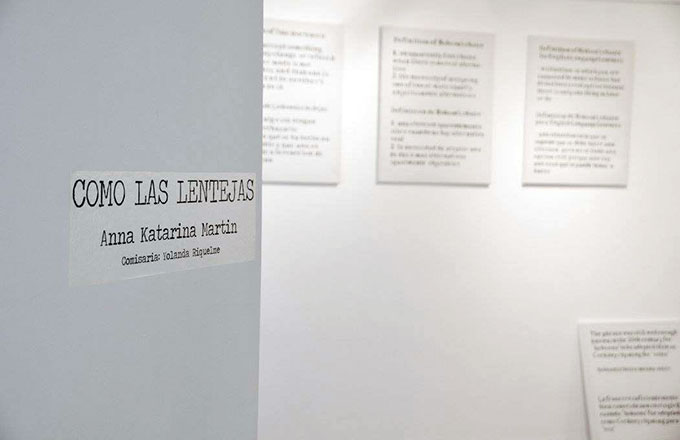| LO TOMAS O LO DEJAS | |||
| Instalación: luminoso, obra gráfica, 2017 | |||
 |
|||
 |
|||
 |
|||
 |
|||
 |
|||
| Olalab, Santiago de Compostela 2017 | |||
| LO TOMAS O LO DEJAS | |||
| Instalación: luminoso, obra gráfica, 2017 | |||
 |
|||
 |
|||
 |
|||
 |
|||
 |
|||
| Olalab, Santiago de Compostela 2017 | |||
|
|||
[ES] La vida actual es propensa a plantearnos situaciones ante las que sólo cabe la aceptación, resignada o no, pues nada podemos hacer por evitar sus implicaciones o consecuencias. Mucho menos por exponer nuestras objeciones o solicitar que se revisen los parámetros bajo los que se tomaron las decisiones de las que traen causa estas situaciones, posturas que se sitúan casi en el terreno de la resistencia a la autoridad. |
|||
[ENG] The actual life is prone to present us to situations to which one can only accept, resigned or not, because there´s nothing we can do to avoid the implications or consequences.A lot less exposing our objections or requesting to review the parameters under which decisions were taken that brought these situations, positions which are almost in the area of resistance to authority. Definitely we find ourself with the well-known policy of whats done is done and cant be changed, to which some refers to as in its french form fait acompli. In a pure spanish way, we usually use the expression "lentils" to refer to these situations, synthesizing a longer and more explicit construction ("these are lentils, you have them if you want and if you dont you leave them") with a obvious popular origin. |
|||
|
|||
| [ES] Recoge la expresión completa: Estas son las lentejas, las tomas o las deja. Frase con la que se manifiesta que no hay posibilidad de elección, que algo es de cierta manera y no hay posibilidad de que cambie. O se toma tal cual o no se toma. Muchas veces se usa solo la primera parte; así, si nos dicen que algo "son lentejas", sabemos que tenemos que aceptarlo como es. Tiene su origen en una zarzuela en la que la protagonista, en un arranque feminista, le dice a su marido de una forma ocurrente basada en una rima fácil, "te guste o no, esto es lo que hay". |
|||
[ENG] Comes from the complete expression: These are lentils, take them or leave them |
|||
LAS LENTEJAS |
THE LENTILS (Tolbaños de Arriba) Today at noon I gave him lentils And seeing that he was poking And arched the eyebrows I said mockingly: These are lentils, Have them if you want And if you do not leave them. |
||
| [ES] Traducido al inglés sería Take it or leave it (la construcción literal equivalente a nuestro "lo tomas o lo dejas") o la expresión tradicional "Hobson's choice" | |||
| [ENG] Translated into English would be Take it or leave it (the literal construction equivalent to the spanish "lo tomas o lo dejas") or the traditional expression "Hobson's choice" | |||
|
|||
|
|||
|
|||
[ES] Origen y Etimología de hobson's choice ( la elección de hobson) |
|||
| [ENG] Origin and Etymology of hobson's choice Thomas Hobson 1631 English liveryman, who required every customer to take the horse nearest the stable door or none at all. This rule became known as Hobson's choice, and soon people were using that term to mean "no choice at all" in all kinds of situations. |
|||
|
|||
[ES] Es una propuesta que no admite variantes, una expresión que define claramente una situación en la que uno no tiene más que aceptar lo que se le ofrece o quedarse sin nada o con lo mínimo y hay que aguantar que vienen mal dadas.Se ponen sobre la mesa asuntos destacados de la vida nacional; da lugar a comentarios, críticas y análisis que dan un panorama imparcial para que el espectador forme su propio juicio. |
|||
[ENG] It's a proposal that doesnt admit any variations, an expression that clearly defines a situation in which one has only to accept what is offered or to leave it stick to nothing or the minimum and it is necessary to hold on even if things go south. Importante issues of national life are called in cuestion; it gives rise to comments, criticisms and analyzes that offers an impartial panorama, a fair picture, for the viewer to form his own judgment. |
|||
| < Back | Text |
|||||
|
||||||
| esto | ||